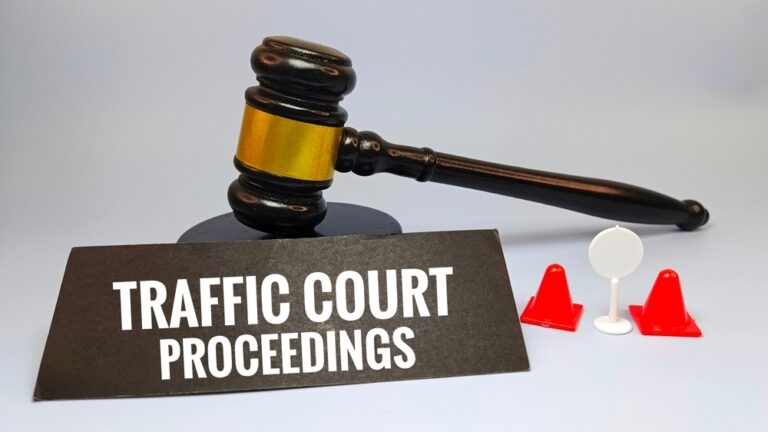
Getting a traffic ticket in New Jersey may seem like a small matter at first. But once you read the fine print and realize that points, fines, and even license suspensions can follow you for years, the stress starts to set in. Many people aren’t sure what actually happens once a ticket is issued or how a municipal court appearance works. Understanding the process can help you feel more prepared and confident about what’s ahead.
I’m Lauren Scardella, Esq., a New Jersey Municipal Court defense lawyer, and I guide people through these cases every day. Here’s what you should know:
Not Every Ticket Requires a Court Appearance
Some traffic tickets in New Jersey can be paid online or by mail via the Violations Bureau schedule, especially when the “Court Appearance Required” box is not checked on your ticket. These usually cover more minor or routine offenses. But if your ticket requires a court appearance or you want to contest the charge, you will need to go to municipal court. But, even when a court appearance is not required, it may be in your best interest to request a court appearance because paying your ticket online can result in points being added to your license.
Failing to appear when required can result in a warrant, additional fines, or possible license suspension. Depending on your court’s rules and the nature of the violation, virtual or in-person appearance may be required.
Common Traffic Violations in NJ Municipal Court
Municipal courts in New Jersey hear a wide range of traffic-related cases. The most common include:
- Speeding (from minor over-limit tickets to excessive speeding).
- Careless or reckless driving.
- Running a red light or stop sign.
- Driving with a suspended license.
- Failure to yield or improper passing.
- Driving without insurance.
While some of these offenses might seem minor, others can carry serious penalties that affect your license and insurance.
What Happens in NJ Municipal Court When You Get a Traffic Ticket
Municipal courts handle traffic violations, DWI/DUI charges, and other disorderly persons offenses. These courts are busy, and traffic matters make up a large part of their calendars.
When you walk into (or log into) a municipal court session, you’ll see a mix of people there for speeding, running red lights, driving without insurance, and more. The judge, prosecutor, and court staff work through these cases one by one.
What to Expect on Your Court Date
When your name is called, you’ll have the chance to speak with the prosecutor. This is your opportunity to ask about a plea deal or to contest the ticket. Depending on the violation, the prosecutor may agree to reduce the charge to one that carries fewer points or lower fines.
If you decide to plead not guilty, the court will schedule a hearing before a judge. If you have a trial, the officer who issued the ticket will testify, and you’ll have the chance to present your side. The prosecutor must prove the State’s case beyond a reasonable doubt, just like in a criminal trial.
Possible outcomes include:
- A dismissal if there are legal or evidentiary issues.
- A plea agreement to a lesser offense with fewer or no points (this would happen before your trial).
- A conviction for the original charge, with full penalties imposed.
- In some cases, the judge’s decision to adjourn (postpone) the matter to allow you time to hire an attorney or bring in additional documents.
The MVC Points System and Why It Matters
In New Jersey, most moving violations carry points assessed by the Motor Vehicle Commission (MVC). For example:
- 2 points: Speeding 1-14 mph over the limit.
- 4 points: Speeding 15-29 mph over the limit.
- 5 points: Reckless driving or speeding 30 mph or more over the limit.
If you accumulate 12 or more points, your license will be suspended. Even a few points can lead to higher insurance premiums over time. Points may be reduced if you drive without additional violations for at least one year. Also, completing an MVC-approved defensive driving course may remove up to 2 points, provided you haven’t used that point-reduction option in the past five years. NJ law also requires surcharges if you reach six or more points within three years. Unpaid surcharges can lead to collection actions and suspension of your driving privileges.
Insurance Consequences of Traffic Tickets
Insurance companies in New Jersey often use MVC points as a factor in setting your rates. That means a single traffic ticket could increase your premiums significantly. Some violations, like reckless driving, can result in particularly steep hikes. In addition to insurance increases, certain offenses, such as driving while suspended or driving without insurance, may trigger mandatory surcharges assessed by the MVC. Also, accumulating six or more points within a three-year span requires surcharges under NJ law.
This is why fighting a ticket or negotiating for fewer points is not just about avoiding court fines. It can also protect your long-term finances.
Why Legal Guidance Matters
You may be tempted to just pay the ticket and move on. But that can be a costly decision. A lawyer can:
- Negotiate with the prosecutor to reduce the charges.
- Help you avoid unnecessary points on your license.
- Represent you if your case goes to trial.
- Explain how your ticket may affect your record and insurance.
Because municipal courts move quickly, having someone who understands the system can make a real difference.
Frequently Asked Questions About NJ Traffic Tickets
1. Do I need a lawyer for a traffic ticket in New Jersey?
Not always, but having a lawyer can improve your chances of reducing fines, avoiding points, or even getting charges dismissed.
2. How long do traffic tickets stay on my record in NJ?
Tickets remain on your driving history permanently, but MVC points can be reduced over time with safe driving or defensive driving programs.
3. Can I fight a traffic ticket if I live out of state?
Yes. Many municipal courts allow certain appearances to be handled virtually, and an attorney can often appear on your behalf for routine matters, depending on the court’s rules.
How a Municipal Court Defense Attorney Can Protect Your Record in NJ Traffic Cases
Paying for the ticket is not your only option. What happens in municipal court can impact your license, your insurance rates, and even your future.
If you’re facing a traffic violation or DUI in Burlington, Ocean, Middlesex, Mercer, or nearby New Jersey counties, I can help you understand your rights and options. As a municipal court defense lawyer, I regularly handle traffic and DUI cases, many of which are managed remotely. For serious DUI charges or cases involving license suspension or other significant penalties, in-person hearings may be required. Whatever level of representation your case requires, I’m here to provide trusted guidance to help you move forward.
Reach out today to discuss your case, explore your options, and take steps to protect your driving record with someone who knows New Jersey law and how local courts operate.
Disclaimer: The articles on this blog are for informative purposes only and are no substitute for legal advice or an attorney-client relationship. If you are seeking legal advice, please contact Lauren Scardella, Esq. directly.
